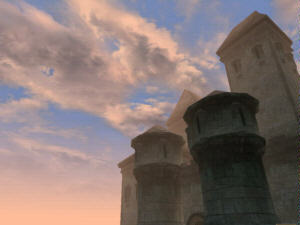Sunday 7 August 2005

|
Pic of the day: A large part of the book takes place in castles. This picture however is from the game Morrowind. Indeed, the tone of the book is somewhat similar to the graphics in Morrowind: Somber, stark, dramatic. Runelords book 1 reviewI've read quite a bit of magic fantasy through the years, so it is truly strange that I have not heard about (or at least not noticed) David Farland. I mean, I've read most of Robert Jordan's Wheel of Time books, for instance, until I got fed up with how he kept stretching the plot to milk the fans. (Not that a worker isn't worth his pay, but I don't read to keep people employed.) Anyway, it seems Farland is another of these guys who actually can write epic fantasy and make a "believable" world with a consistent magic system. I thought it was just a 13-a-dozen fantasy romance book, so I only bought the first in the series. After reading most of it, I went and bought the three next, which was all there was. So yeah, I did like it. I was impressed. The book is only called "The Runelords" on the cover, but inside it is also called "The Sum of All Men", which is how it is listed in online bibliography. Runelords is there the name of the series. I have only read the first book and started on the second, so this is all about the first book and especially the world where it takes place. ***The magic in his world consists of several types, but the dominant magic is that of the Runelords. These are men (and some women) who have been augmented by transferring basic attributes of other people. For instance, by adding an endowment of brawn, you get twice as strong... but the giver ("dedicate") becomes weak as a kitten. This is magic, so there is no scientific logic to what can be transferred. You can for instance transfer the "glamor", making one person ugly while the other becomes that much more beautiful. If you transfer "voice", you not only can shout louder but also convince people more easily. A special case is "metabolism", which roughly translates into the speed of life. A person with a rune of metabolism can move at twice his normal speed, but he also needs twice as much food and grows old twice as fast; the dedicate lies in a coma but hardly ages at all. There is also elemental magic which is more nebulous and unpredictable. The elements of Earth and Fire have come in conflict with each other over the fate of mankind. Earth wants to preserve the species, but Fire wants them done away with. It favors another species from the volcanic underworld, a race of monstrous beings unlike anything alive on the surface. Earth has chosen a champion, a young Runelord, but he is pretty clueless about this aspect of magic and things don't always go his way. There is a lot of drama and tragedy. This is totally sword & sorcery. Humor is rare, dark and subdued. The plot is the classic "clueless young man is chosen to save the world", but it is done with great imagination and a keen sense of plot. The characters are also generally less pigheaded than Robert Jordan's... not that this says much, I guess. Then again most of them are from the upper classes and well educated. The book has good progressions and a kind of resolution, but it is very clearly meant to be the first in a series. That's OK, I would just want it to go on and on anyway. As is often the case with self-important Save The World books, sexuality is not a big motivation. The romance is sparse and chaste. The male hero has the chance once or twice, but prefers to wait until the wedding night. I'm not kidding you about the wedding night, and even then it's only one sentence. Not exactly Piers Anthony. Even the villains are more interested in power than sex. Also unlike Terry Goodkind's attempt at epic fantasy, the arch-villain is not simply an incarnation of evil. He honestly think he is mankind's last and best hope, and only by drawing the attributes of a large part of the world's population into himself can he become the Sum of All Men, the mythic superhuman who is invincible and can save the world. The world however doesn't want to be saved by the likes of him, and conflict ensues. ***In fact, a strength of this book is the way heroes and villains are basically common people only with magic powers. People make mistakes. Good people can do bad things. Villains can show common decency. War is hell, and sometimes people face choices that no human should need to make. Some break under pressure, but in most of the men and women we meet, there is a strong foundation of decency. Even when they do things no one likes to think about, they try to do their best. Recommended only for the serious fantasy reader. If you want a quick fluffy story, this is not it. I'm putting it next to Stephen Donaldson's Covenant trilogies on my bookshelf. |
Yesterday <-- This month --> Tomorrow?